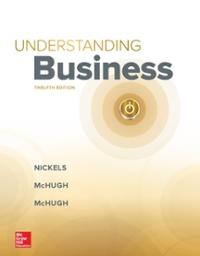Question
I have my ethical views and you have yours; neither my views nor yours are better or more correct. I may believe that a particular
I have my ethical views and you have yours; neither my views nor yours are better or more correct. I may believe that a particular war was unjust, and you may believe that it was just. Someone else may believe that all war is wrong......we each have our individual histories that explain how we have come to hold our particular views or attitudes. But they are just that-our own individual views and attitudes. We cannot say that they are correct or incorrect because to do so would assume some objective standard of right and wrong against which we could judge their correctness. Such a standard does not exist.
Cultural Relativism
Ethics: Theory and Contemporary Issues 9th Edition (p. 46)
Assignment 1 explored ethnocentrism. Assignment 2 will explore cultural relativism. This one will require deep pondering. You begin by asking yourself if there are certain absolute rights and wrongs. Then consider if you have ever violated an absolute wrong? How do you KNOW that something is absolutely wrong? By what standard do you judge others actions?
Remember applied ethics? Let's explore some case studies so you can practice applying what you have learned.
First, we need to establish some assumptions:
You have established what is right and wrong for yourself
You have based your belief about what is right and wrong in such things as religion, education, humanism
One of those beliefs is "killing is wrong." You could never kill. This belief is NOT relative to a culture or situation; it is an absolutemetaethicalwrong.
Case Study #1
You study the Inuit culture and find that the elderly would be stabbed or left to freeze on ice flows.Death occurs swiftly. You think how barbaric this was and judge the culture as such. Now consider the way many elderly die in the U.S. today: confused, moaning, incontinent in diapers, a slow, agonizing death, perhaps being tube fed and given medications to prolong life. How would the Inuit of the day view our culture from this lens?
Case Study #2
You are studying ethics in war. You are not concerned about killing in war. War has different rules. Killing is OK in war. You HAVE to kill to be in war. Watch the trailer forHacksaw Ridge. Private Doss participated in war yet held to his ethical beliefs. He did not kill, he saved, at great personal risk. Does this now mean that killing during war is wrong? Does it mean that killing during war is right? Does it support that everything is relative to our cultural beliefs?
Case Study #3
Lawrence Franks (84) promised his wife, suffering with dementia, that he would never put her in a nursing home. Lawrence lovingly cared for his wife for years until her condition became too serious, and he was unable to properly care for her. He felt that she was suffering. He then killed his 86-year-old wife to fulfill his promise. He was charged with murder. (https://www.foxnews.com/world/elderly-man-beat-dementia-stricken-wife-to-death-in-mercy-killing). Is Mr. Franks guilty of murder?
Case Study #4
JungdanChow and his family have a tradition passed down for generations. The entire family would go to the markets to pick out dinner. This was a very special dinner as delicacies they could not typically afford were carefully chosen and prepared. Even the young children could sense the excitement in the air as they strolled through the market. Bat and fresh, boiled dog, were chosen that day and they hurried home to begin the feast, feeling connected to their ancestors by hundreds of years of tradition.
...wet markets are the predominant food retail outlets for fresh produce and meat in Chinese cities. They have very few supermarkets.... hedgehogs and peacocks and wild rabbits and snakes, deer; crocodiles as well. Many of these wild animals, they're not necessarily caught in the wild - right? -sothey can be farmed animals. They're just exotic food that's not very commonly found. Eating wild animal is considered a symbol of wealth because they are rarer and more expensive. And wild animals are also considered more natural and, thus, nutritious, compared to farmed meat. It's a belief in traditional Chinese medicine that it can boost the immune system.
Excerpted from: https://www.npr.org/2020/01/22/798644707/why-wet-markets-persisted-in-china-despite-disease-and-hygiene-concerns
Express your thoughts on cultural relativism.
Include the following aspects in the assignment:
How would you judge right and wrong from different cultural perspectives and different situations?
When making an ethical decision that will impact others, how would you assure that you are not viewing right and wrong from the perspective that only your culture knows?
To complete this, write one paragraph for each Case Study
There is no right or wrong answer here; you will be graded on the depth of your reflection
Cite any references. Use proper grammar, sentence structure, and spelling at all times.
Step by Step Solution
There are 3 Steps involved in it
Step: 1

Get Instant Access to Expert-Tailored Solutions
See step-by-step solutions with expert insights and AI powered tools for academic success
Step: 2

Step: 3

Ace Your Homework with AI
Get the answers you need in no time with our AI-driven, step-by-step assistance
Get Started


